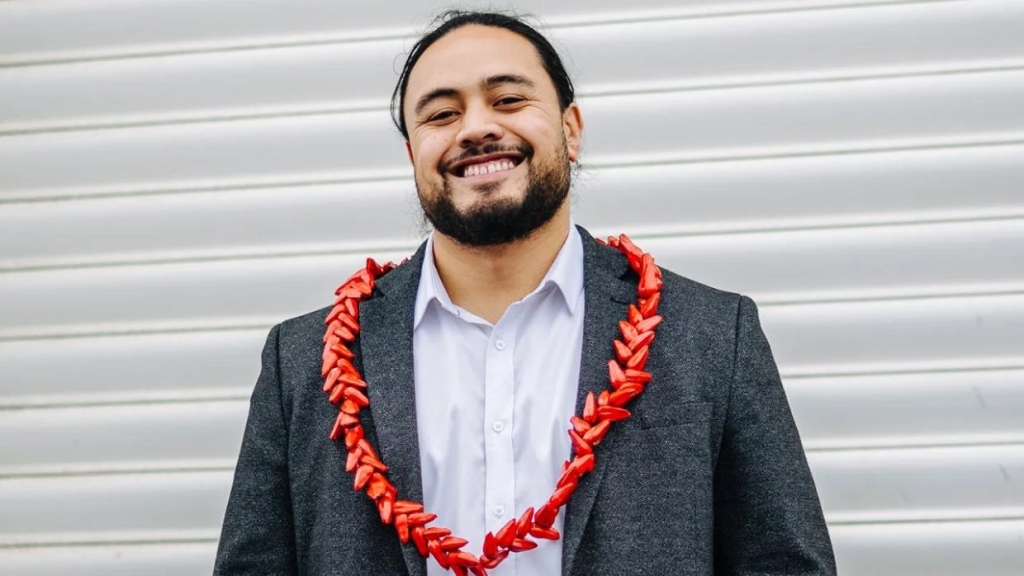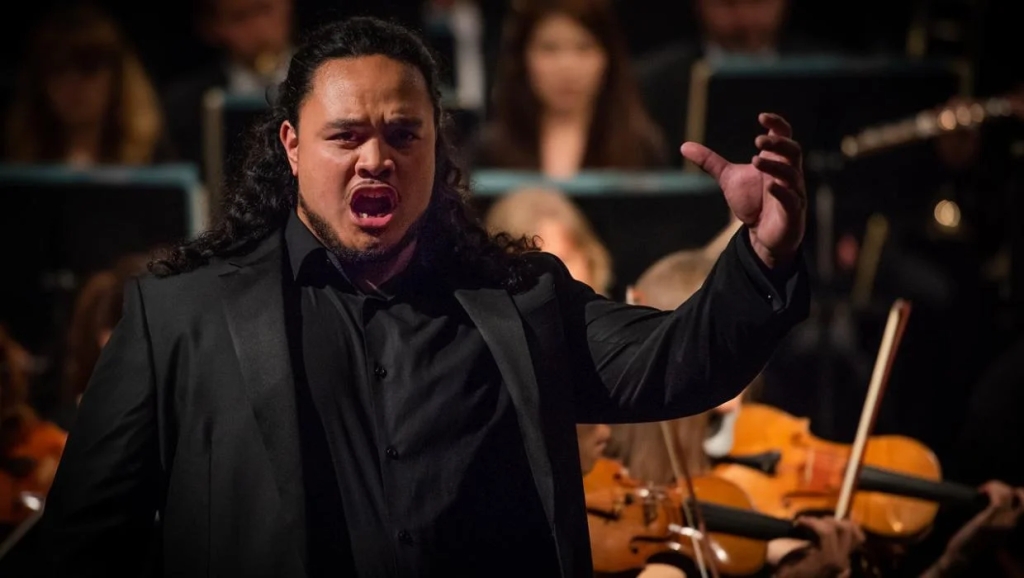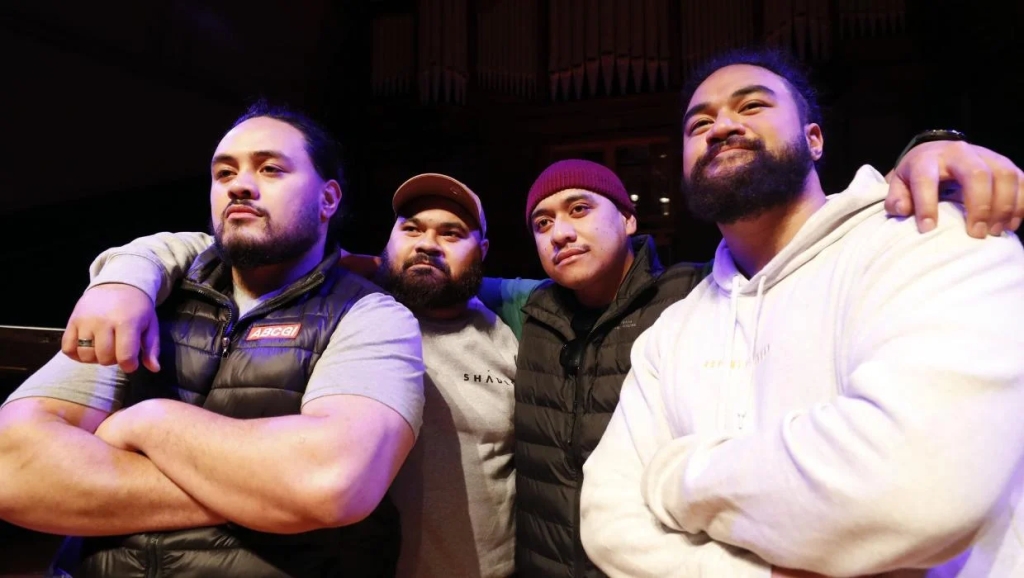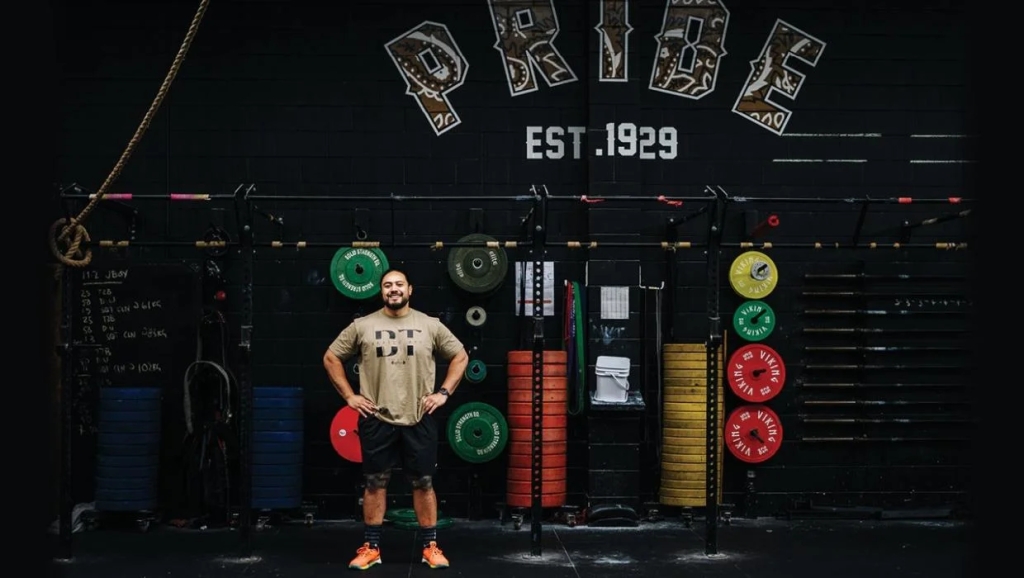
Tupac fan Samson Setu thought professional rugby was his future until opera – and his extraordinary talent – led him to the world’s most prestigious stages, writes Richard Betts.
Samson Setu is telling Sunday about his anxiety dream. It’s of a very specific type, that only an opera singer would experience. In it, Setu is not long off the plane from London, jetlagged and bedraggled, when Dame Kiri Te Kanawa, ONZ, our greatest cultural figure, phones. She asks whether Setu has auditioned for the Royal College of Music, as he was supposed to, as he planned, as destiny demands. He hasn’t.
In Setu’s dream, Dame Kiri issues a curt, “Wait there, I’ll call you back.” Not long after, he’s told to be on a plane back to the UK the following day, where, upon arrival, he absolutely will have that audition, even if it – or Dame Kiri Te Kanawa, ONZ – kills him.
Of course, it isn’t an anxiety dream; it happened to Samson Setu. That was 2019, when he was a young man with talent but far from the finished article. Having won his audition at the Royal College, these days he’s a rising star of New Zealand opera, yet another Samoan New Zealander with a beautiful voice and the world in his sights. He gives a lot of credit to Dame Kiri for helping his career get to this point – as well as benefiting from her formidable Royal College connections, he received priceless support from the Kiri Te Kanawa Foundation that assists young singers – but he was born with that voice. Not that he realised it.
Setu didn’t grow up with classical music. As a kid he liked reggae, especially Bob Marley, and was a big fan of Tupac. The only time he sang was at the Good News Family Church in Manurewa, where his grandfather was pastor.
“We had no choice but to sing or play in the church band,” Setu says. “It wasn’t until high school that someone told me, ‘You know, that voice isn’t normal for a 16-year-old’.”
That was Claire Caldwell, then on staff at Dilworth School.
“Samson walked into the music department and wanted to take music as a subject,” Caldwell, now working at NZ Opera, recalls. “We asked what his instrument was and in this booming voice he said, ‘Bass guitar.’ The singing teacher Ian Campbell and I looked at each other and said, ‘Young man, with a speaking voice like that, you’re a singer’.”
Setu didn’t think so; singing was hardly special.
“Everyone sings in church,” says Caldwell. “So the idea that singing would be anything special is something a lot of Pacific Islands people struggle with. It’s not seen as a skill, it’s too ordinary.”
Caldwell’s faced this dynamic before. As well as Setu, at Dilworth she discovered Samoan New Zealanders Joel Amosa and Filipe Manu, the latter just a year above Setu. Both of them went on to win our most prestigious classical singing prize, the Lexus Song Quest. Even now, Setu isn’t sure singing is anything praiseworthy.
“Singing and dancing enrich our culture, so to be able to make money off it is a cheat code,” he says, bursting into laughter. “‘You sing for a living? That’s what we do every other day.’ I’m like, yeah, I know, it’s not right.”
An unlikely opera star
Except most people don’t sing the lead role in m(ORPHEUS), NZ Opera’s post-modern remake of Orfeo ed Euridice, which plays in Auckland and Wellington between 6 and 23 September. Christoph Willibald Gluck’s work, an operatic staple since its 1762 debut, is being given a 21st-century polish by Kiwi composer Gareth Farr, who has reorchestrated the piece for just 10 instruments, and not the ones in the original work. It’s a big sing. Setu’s character – Orfeo, the musician who descends into the underworld to rescue his wife Euridice – is on stage almost the entire time, and consumes much of the first act’s music.
“There are parts that are tricky to navigate,” Setu says. “It’s going to take some time singing the role into the body but we have a long rehearsal period, so that will come.”
Setu isn’t the singer you’d expect to hear in this role. Orfeo was written for a much higher voice, and is mostly performed by a mezzo-soprano or counter-tenor. In this production the vocal line will be adjusted to meet Setu’s molten chocolate bass-baritone, so it should sit nicely within his range. But this production is being directed by Neil Ieremia, leader of the acclaimed dance troupe Black Grace. No one yet seems quite sure how that will play out on stage, but expect rhythm, momentum and a few contemporary dance moves.
Claire Caldwell reckons Setu will be fine.
“There’s a grace in there,” she says. “I’m excited to see how that’s brought out in this production. You don’t necessarily look at Samson and think he’s a dancer.”

You don’t necessarily look at him – powerfully built, long-haired – and think he’s an opera singer, either. He almost wasn’t. In his third year as a music undergraduate at the University of Otago, he threw it in.
“I was enjoying the singing but it was everything else,” Setu says. “We were encouraged to network or schmooze, and I didn’t know the slightest thing about any of it. A lot of the people were from a completely different demographic to me; we had nothing in common, so I would struggle to make conversation and to answer questions that seemed intrusive.”
With hindsight, Setu realises that in those moments he was pretending to be someone he wasn’t and the solution was simply to be himself. He says these days he’s much more comfortable in that world. At the time, though, he couldn’t stand it. Call it a crisis of confidence, call it an almighty strop, but Setu escaped to Brighton, England, where he pursued a long-held dream to play professional rugby. He was offered a contract and only returned to New Zealand to pack his things. Setu’s mother staged a last-ditch intervention – “She convinced me that I should see the study through” – and instead of quitting altogether, he transferred to Auckland, where he found the support he needed among fellow vocal students with shared Pasifika backgrounds, and in singing teacher Te Oti Rakena. It was Rakena who assured Setu he was good enough to sing professionally.
“[Rakena] instilled a lot of confidence in me and reminded me, in his words, ‘You’re good enough to go far, to go beyond these shores; just give me a couple of years.’”
Working with the best
In a couple of years Setu was in London. The experience was cut short by Covid, but Setu got a lot from his time at the Royal College of Music.
“You work with some of the best teachers and technicians in the world. Some of the coaches at the college were also coaches at the Royal Opera House, so you can only imagine the amount of information we absorbed.”
His London adventures coincided with those of old schoolmate Filipe Manu, the exciting young soprano Madison Nonoa, who sings the role of Amor in m(O)RPHEUS – “She’s a Samoan girl, so we have those automatic connections” – and tenor Manase Latu, one of the vocal students Setu bonded with when he transferred from Dunedin back to Auckland.
“Manase and Filipe were living in the same building; being able to walk to Covent Garden was awesome. I thought I would be overwhelmed but it was amazing.”
If Setu liked London, he absolutely loved New York. He was there having won a place on the Metropolitan Opera’s prestigious Lindemann Young Artist Development Program. On the same course was Manase Latu. The pair shared the experience and an apartment, living together on Manhattan’s Upper East Side.
“Catching the train to the Met every day, you’re not running low on inspiration,” Setu says. “To be able to walk those halls so many great singers have walked before you, it’s such a cool experience. To be able to watch any opera any day of the week. I was blessed to have that opportunity, and to share it with my best mate Manase again, you couldn’t script it.”
“He was an absolute pain!” says Latu with a belly laugh. “He was good for me because he’s one of the cleanest people I know. Very organised, very structured; he likes his routines.
“It was nice to have the support of someone who knows you inside out, and also that ear of someone who’s heard you from where you began and seen you evolve and develop. He’s a kind person, really generous and not only with his time. Samson’s left a big hole in our friend group in New York. He was the one who brought us together; he was the glue.”

Southside pride
Days after this interview, Setu and Latu jetted to Croatia to tour with their vocal quartet The Shades. The group is completed by Ipu Laga’aia and Taka Vuni, two more singers from the Auckland University band of brothers.
“We were the only Pacific Island boys in the class,” Setu recalls. “I think the first week someone said, ‘You guys want to go for a jam?’ We went to a practice room and sang Franz Biebl’s ‘Ave Maria’. It was perfect for us. We went, ‘This is cool, we should hang out more.’ [With The Shades] we try to combine classical music with popular songs, so people can see there’s fun in opera.”
When Setu returns from Croatia, he’ll be too busy for fun. He’s got m(O)RPHEUS, and then he’s moving to Switzerland as a contracted singer at Zurich Opera House. This is the beginning of his career proper, where he will sing every week to filled halls.
“Zurich’s a good place for young artists,” Setu says. “Literally the day I signed my contract, they had already assigned me three roles for the season. That’s what you want, as much stage experience as you can get. You can only learn so much in a practice room, you’ve got to be out there doing it.”
London, New York, Zurich – they’re all a long way from Manurewa, but at Setu’s request, we’re conducting this interview in Brown Pride gym, Manukau, not far from his childhood home. Why?
“For me, keeping fit and singing go hand in hand, and my love for both is equal,” he says. “To be in this gym in particular is a positive, something coming out of South Auckland. I remember hearing [co-founder] Johnny [Timu] on a podcast and him and his boys saying, ‘Let’s make something positive in this community,’ and the gym is a product of that one whiteboard session. It’s more than just a gym, it’s a beacon of hope for young kids coming up in South Auckland. And my story is similar in a way; I never thought I’d be singing opera for a career or living in New York, London. If you’d told this Manurewa boy I’d be overseas singing opera, I would have laughed.”

NZ Opera’s m(ORPHEUS) runs in Auckland from 6 to 10 September, and in Wellington from 20 to 23 September.
First published in The Sunday Star Times, Sunday magazine, 23 July, 2023.
https://www.thepost.co.nz/wellbeing/350039103/samson-setu-unlikely-opera-star-no-ordinary-voice